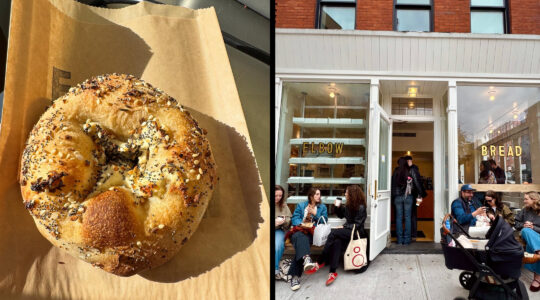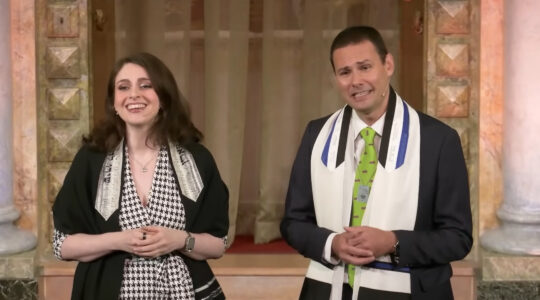Just prior to resting the governmentís case in the civil rights trial of Lemrick Nelson Jr., Assistant U.S. Attorney Lauren Resnick read a statement from an attorney who defended Nelson in his first civil rights trial in 1997.
"The evidence will show that it is not true that Lemrick Nelson stabbed Yankel Rosenbaum," Trevor Headley said then, insisting the police were "partially untruthful in their testimony or mistaken, or deliberately lied."
In the current trial, Nelson’s new legal team does not dispute their client’s involvement in the crime, but insist there is no proof he acted to deprive the Australian chasidic scholar of his right to use a public street because of his religion: the basis of a conviction in the ’97 case.
Resnick was expected to again raise the denial in her rebuttal to the defense’s summation on Wednesday: the last word from either side before the judge charged the jury to begin deliberations.
The question of allowing defense statements from the first federal trial and a 1993 state murder trial to be presented to the current jury was the subject of hours of arguments in the chambers of Judge Frederic Block of Brooklyn Federal Court Monday and Tuesday. Block initially seemed to be leaning toward allowing the statements, but announced late Monday that he would not.
On Tuesday, he decided to split the difference, allowing Headley’s statement on Nelsonís innocence but not that of Arthur Lewis, who successfully convinced a Brooklyn jury that Nelson did not murder Rosenbaum.
Anticipating that Resnick would attack his credibility in her rebuttal, defense attorney Peter Quijano angrily accused the government "desperation" for suggesting that "we should be penalized because some dingleberry lawyer in a prior trial tried to perpetrate a fraud, a lie!"
In his summation Quijano, who called no witnesses during the trial, said his client was guilty of "a horrible choice in judgment" for taking part in the gang that attacked Rosenbaum. But he said no witness had testified that Nelson acted out of bias, or to deprive him of his right to use a public street: the basis of a civil rights conviction.
Rather, Quijano noted that two witnesses cited Nelson’s claim that he was drunk and caught up in the excitement of the riots.
"Never forget what this case is about and what it is not about," said Quijano. "Whatever inexcusable thing Lemrick Nelson did to Yankel Rosenbaum that night, it wasn’t a [civil rights] crime."
Prosecutor Christina Dugger, however, had insisted Nelson knew nothing about Rosenbaum (who wore a yarmulke, a long beard and tzitzit) but that he was a Jew.
"There was nothing between them, no grudge no unpaid debt," she told the jury. "This wasn’t a fight over a woman. Yankel Rosenbaum didn’t know what you know now. That what motivated [Nelson] was the fact that he was a Jew using this street at the wrong time.
"If he was Indian, Chinese, Puerto Rican or black, or dressed as a Catholic priest, would he have been attacked?"
As Dugger described, in graphic detail and with the aid of an illustration, the stab wounds that led to Rosenbaum’s death, his brother, Norman, quietly wiped tears from his eyes as he sat in the gallery.
Nelson, who was taken from the court in an ambulance, complaining of asthma symptoms during similar testimony from a medical examiner last week, was expressionless.
"The only way they could get him was to stab him," Norman Rosenbaum said during a break in the summations. "Otherwise he would have fought them off."
A key point in both arguments turns on whether Nelson was part of the crowd of youths who listened as Charles Price incited a mob to take revenge against Jews for the accidental death of a black child. (Price has pleaded guilty.)
The police officer who arrested Nelson testified that Nelson is seen in videotaped evidence listening to the crowd. The image presented in court, however, is difficult to discern, and the officer, Mark Hoppe, admitted that in the previous trial he identified the wrong person.
Without that smoking gun, defense lawyers hope the jury will see no connection between the anti-Semitic shouts heard clearly on the video and Nelson’s later actions.
On Monday, Nelson’s ex-girlfriend, Travionne Shaw, testified that Nelson regretfully told her he committed the attack because he drank too much. She also said he never referred to Rosenbaum as a Jew or mentioned a racial motive.
Had bias been his motive, Quijano insisted in his closing, Nelson would have said so to Shaw.
"There was nothing hanging over his head at that time," said the lawyer. "No federal charges. He had no reason not to tell the truth."
But the prosecution insisted Nelson had cleaned up his story in order to maintain his relationship with Shaw, whom Dugger described as "the nice girl with the curfew."
Quijano also noted in his closing that Edward Brown, the veteran homicide detective who extracted a confession from Nelson, asked the suspect if he had stabbed Rosenbaum because he was Jewish. Nelson, according to Brown, said "that didn’t bother me."
Prosecutors noted that Brown was investigating a state murder case, not a civil rights violation, and thus the motive was unimportant at the time.
Brown also testified that he was unable to conduct an extensive interview at the 71st Precinct in Crown Heights because he was ordered to take Nelson to another station, allowing the suspect ample opportunity to reconsider his confession and decide to "clam up" until he spoke to a lawyer.
Also prior to the closing, jurors listened to a series of frantic 911 calls from Crown Heights residents during the early hours of the riots that would last nearly four days.
"How many police cars are around here?" one female caller, whose identity was withheld by Block, demanded. "How come we have no police protection?"
Nelson is being tried again because an appellate court ruled that the presiding judge in the last trial, David Trager, went too far in ensuring a balanced jury that included both blacks and Jews. No such consideration was made in the current trial. The jury is overwhelmingly black, with no Jews.
Following the summations Tuesday, Norman Rosenbaum, who was present each day of the trial, took issue with the defense claim that there was no proof Nelson intended to deprive his brother of the right to use a public street.
"They didn’t go into houses," he said. "They waited in the street and chased him in the street."
Nelson faces life imprisonment, but he was sentenced to 19 years and seven months after his 1997 conviction.
If he is acquitted, prosecutors have no further options in pursuing the case. But Rosenbaum, who fiercely lobbied a reluctant Justice Department to bring charges in 1994, refused to say that he would give up.
"We’ll explore whatever alternatives are there," Rosenbaum said.
In court Wednesday to show support for Rosenbaum was Carmel Cato, the father of the 7-year-old boy who was struck and killed by a car driven by a member of the Lubavitcher rebbe’s motorcade. The accident sparked the riots that led to Yankel Rosenbaum’s death.
Rosenbaum and Cato have maintained close ties since the 10th anniversary of the accident.
The New York Jewish Week brings you the stories behind the headlines, keeping you connected to Jewish life in New York. Help sustain the reporting you trust by donating today.




